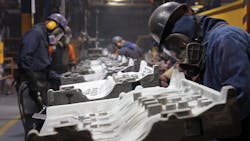Workers’ Organizing Rights Restored at Stellantis Plant
The Mexican government has acknowledged that workers at a Stellantis subsidiary plant were denied organizing rights and moved to resolve such concerns raised by the U.S. Dept. of Labor and the Office of the U.S. Trade Representatives, according to a U.S. government statement. In June the two agencies asked Mexican officials to review the situation at Teksid Hierro de Mexico, following charges raised first in a complaint by the United Auto Workers, AFL-CIO, and an independent Mexican labor union.
The U.S. petition was filed under provisions of the U.S.-Mexico-Canada Agreement that require Mexico to establish regulations for recognizing workers’ collective-bargaining rights. That Rapid Response Complaint allowed the U.S. to threaten suspension of domestic sales of goods from Teksid Hierro until Mexico completed the investigation.
Teksid Hierro, at Frontera, Coahuila, Mexico, is a 100,000-mtpy gray and ductile iron foundry with about 1,500 workers, casting monoblocks and monoblock heads for truck engines (for Cummins Inc., AB Volvo and Mack Trucks Inc., among others) and heavy machinery. It is among numerous foundries in Central and South America, Europe, and China operated by Teksid, a Stellantis holding.
According to the statement by Labor and USTR, Teksid now recognizes Los Mineros, an independent labor union as the workers’ sole bargaining representative, and has facilitated an agreement between that union and Teksid.
Since 2014 foundry workers have accused Teksid of colluding with a larger union to prevent them from choosing the independent union to represent them. In addition to the new agreement, Teksid will repay several years’ worth of dues owed to Los Mineros, and it reinstated (with back pay) 36 workers terminated for participating in protests and organizing efforts at the foundry.
"This successful outcome demonstrates that we are creating a more competitive North American economy where workers and unions can operate on a level playing field,” stated U.S. Trade Rep. Katherine Tai.
